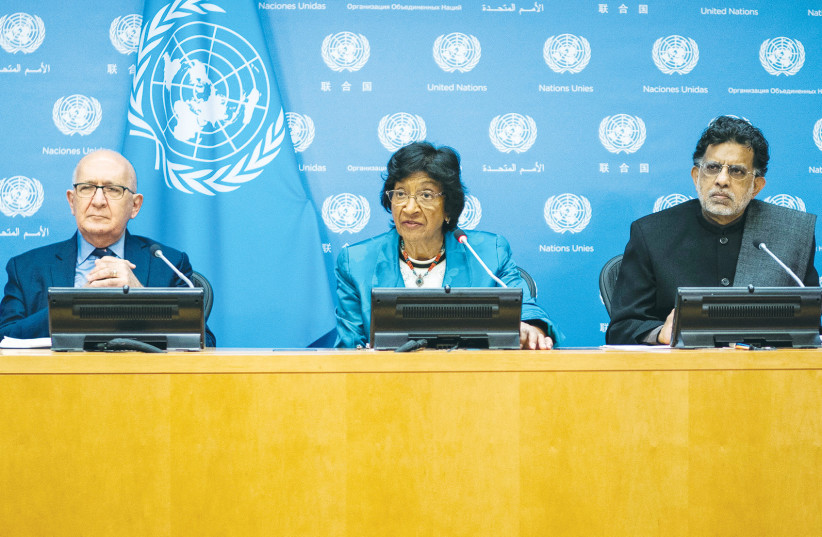Palestinian officials said over the weekend that the Palestinians have scored another “diplomatic victory” after the Third Committee (Social, Humanitarian and Cultural) of the UN General Assembly approved a resolution in support of the right of the Palestinian people to self-determination.
The officials said that the Palestinians are planning to step up their diplomatic campaign against Israel in the international arena in the aftermath of the results of the recent Knesset elections.
The draft on the right of self-determination was approved in a vote of 167 in favor to five against (Nauru, Marshall Islands, US, Israel and Micronesia), with seven abstentions (Cameroon, Kiribati, Guatemala, Paula, Rwanda, Solomon Islands and Togo).
The vote comes days after the UN General Assembly’s Fourth Committee adopted a resolution requesting an advisory opinion from the International Court of Justice (ICJ) on the illegality of Israel’s “occupation” on the grounds that it can be considered de-facto annexation.
The latest resolution was submitted by Egypt, in coordination with the Palestinians, on behalf of the member states of the Organization of Islamic Cooperation (OIC). It is scheduled to be submitted for approval by the UN General Assembly in mid-December.

Introducing the resolution, the representative of Egypt said that the international community still falls short of operationalizing the basic right of the Palestinian people to self-determination, as they “continue to suffer under occupation.”
She said her group, the OIC, supports realization of this right through the establishment of a Palestinian state based on the “borders of June 4, 1967, with east Jerusalem as its capital.”
It also reaffirms the internationally recognized terms of reference of the peaceful settlement of the Israeli-Palestinian conflict and calls for an end to the Israeli “occupation and violations of the human rights of the Palestinian people.”
Israel does not dispute the right of people to self-determination
The Israeli representative said that Israel does not dispute the right of people to self-determination. However, she disputed the political motive behind the resolution, noting a pattern that begins with adoption of non-selective resolutions by consensus, then moves to Palestinians abusing these topics to push their agenda through political resolutions.
Asking delegations to imagine what would happen if the UN gave all those seeking self-determination even a tenth of the attention it gives the Palestinians, the Israeli representative said the draft resolution represents “a relic of the past,” with Israel being isolated in the Middle East and the OIC being used to undermine its existence.
Palestinian Authority hails latest UN resolution
PA Foreign Minister Riyad al-Malki hailed the latest resolution, saying it affirms the Palestinian people’s inalienable and just right to self-determination and ending Israel’s “illegal occupation.”
Malki praised the countries that voted in support of the resolution, calling on the international community “to put in place practical mechanisms to enable the Palestinians to achieve all their rights, including the right to ask the ICJ for an advisory opinion on the ‘occupation.’”
According to Malki, the vote constitutes an international response “to all practices and crimes” of Israel and the settlers.
Rawhi Fattouh, chairman of the Palestinian National Council, the PLO’s legislative body, also praised the vote of the UN’s Third Committee, calling it a “victory for Palestinian rights and the justice of the Palestinian issue.”
Fattouh pointed out that some countries that had previously opposed such resolutions voted in favor of the Palestinian right to self-determination. “This change serves the interests of the Palestinian cause and is considered a victory for the Palestinians,” he said.
